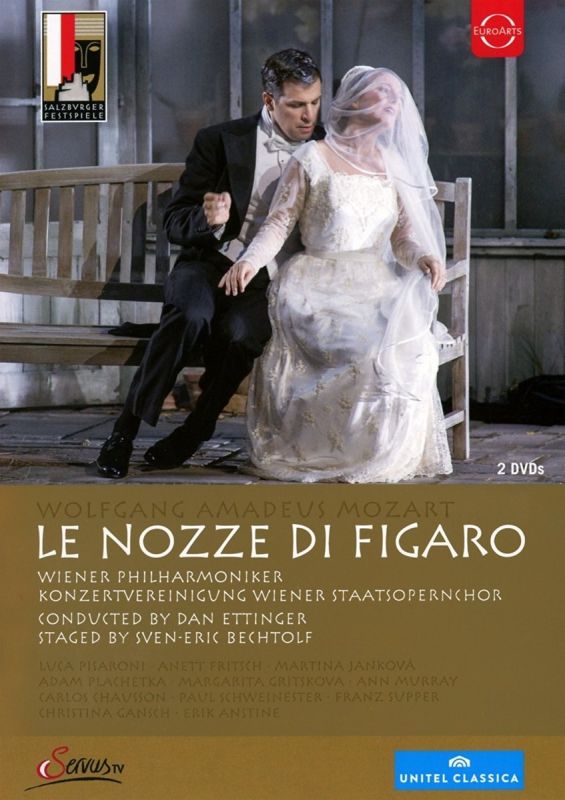MOZART Le nozze di Figaro
View record and artist detailsRecord and Artist Details
Composer or Director: Wolfgang Amadeus Mozart
Genre:
Opera
Label: Euroarts
Magazine Review Date: AW16
Media Format: Digital Versatile Disc
Media Runtime: 190
Mastering:
DDD
Catalogue Number: 207 2958

Tracks:
| Composition | Artist Credit |
|---|---|
| (Le) nozze di Figaro, '(The) Marriage of Figaro' |
Wolfgang Amadeus Mozart, Composer
Adam Plachetka, Figaro, Bass-baritone Anett Fritsch, Countess Almaviva, Soprano Ann Murray, Marcellina, Mezzo soprano Carlos Chausson, Bartolo, Bass-baritone Christina Gansch, Barbarina, Soprano Dan Ettinger, Conductor Erik Anstine, Antonio, Bass Franz Supper, Curzio, Tenor Luca Pisaroni, Count Almaviva, Bass-baritone Margarita Gritskova, Cherubino, Mezzo soprano Martina Janková, Susanna, Soprano Paul Schweinester, Don Basilio, Tenor Vienna Philharmonic Orchestra Vienna State Opera Chorus Wolfgang Amadeus Mozart, Composer |
Author: Richard Lawrence
The action takes place just after the First World War, in which Figaro has evidently served, perhaps as the Count’s batman. Alex Eales’s split-level set is ideal for showing the bustle of the Almaviva household. Sometimes this is a distraction, thanks to the selective eye of the camera: we surely don’t want to be watching the servants having their lunch during the Count’s aria, nor should we be focusing on Figaro at the aria’s climax. More often, though, the simultaneous activity illuminates the tensions and obsessions. During Bartolo’s ‘La vendetta!’ Marcellina goes snooping round Susanna’s room, and she is followed in turn by Basilio and the Count. While Figaro is expounding the advantages of the marital bedroom’s position, the Count and the Countess enter their respective rooms. The Count is evidently a vain man, checking in the mirror for, perhaps, grey hairs or a bald patch. In fact the portrayal of the Count is fascinating. Bechtolf makes the point that times are changing and Almaviva is aware that he can’t claim the privileges of his forefathers. On the other hand, the droit de seigneur was (one might assume) not much of an issue in the 1920s. The Countess is flirtatious with Cherubino: how telling that she hides the copy of ‘Voi che sapete’. But she comes across as a sad figure, retreating to the basement at the end of Act 3 and wistfully getting out her wedding dress.
The characterisation in general is as expected, with one exception. Da Ponte’s Basilio is an intriguer, malicious and ironic: portraying him as being in love with Cherubino, upset when the Count discovers the page alone with Susanna, runs counter to both text and music. When Cherubino is banished, Basilio is on his knees in despair. But it’s not serious enough to spoil the whole. Luca Pisaroni, who plays Leporello and Guglielmo in the companion productions, is cast not as Figaro but as his master: young, charismatic, funny when exasperated. Having fooled around with Cherubino in Act 2 – how sensuously she puts on her stockings! – Anett Fritsch goes on to sing a beautiful, anguished ‘Dove sono’. Adam Plachetka and Martina Janková are a lively, resourceful servant couple, and Margarita Gritskova is a convincingly troublesome Cherubino. The secondary characters are all finely drawn; the arias for Marcellina and Basilio are omitted. Apart from an eccentric slowing-up in the Act 1 trio, Dan Ettinger’s conducting is well paced. For sheer watchability, this production has a lot going for it.
Explore the world’s largest classical music catalogue on Apple Music Classical.
Included with an Apple Music subscription. Download now.

Gramophone Digital Club
- Digital Edition
- Digital Archive
- Reviews Database
- Events & Offers
From £9.20 / month
Subscribe
Gramophone Club
- Print Edition
- Digital Edition
- Digital Archive
- Reviews Database
- Events & Offers
From £11.45 / month
Subscribe
If you are a library, university or other organisation that would be interested in an institutional subscription to Gramophone please click here for further information.






